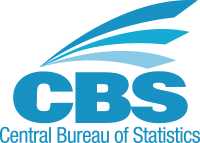Census 2011
History
The United Nations defines a census as: "the complete process of collecting, composing, evaluating, analysing and publishing demographic, economic and social data of all the people in a country at specific pint in time". This same definition also applies to a house count. Just as in other parts of the world, both counts have been conducted simultaneously in the Netherlands Antilles since 1972.
In 2011 the fifth Census took place. Formerly there have been general population counts in 1972,1981 1992 ad in 2011. The 1960 Census was not a general Census because Aruba was not included.
The general character of a census is characterised by the target groups at which the publications of the results are directed. Every citizen has the right to be informed on the state of affairs in his/hers community. That is why the results of the census are placed at the disposal of the whole community of Curaçao.
A Census gives an insight into the living conditions of the population at a certain moment in time. A comparison with the results from previous censuses enables us to form a picture of the past developments and the possibility to anticipate future developments in time. For this reason, the United Nations advises its members to conduct a census every ten years.
The Census has an additional goal, and that is to enable the Population Department to check ther population registers for completeness and to update them. For this reason, an occupants' list was filled out in 2001.
The Census Legislation
In the act of December 9, 1971, providing for rules concerning conducting general population counts, it is stipulated what persons are obliged to participate in the Census. Included are all the persons who, at the moment that the census is conducted, have lived longer than one year on Curaçao or who intend to stay at least one year on Curaçao. The Act prescribes furthermore what the data are that may be collected, the obligation of the citizens to participate in the Census, the cooperation that the Governor ant he Cabinet have to give, the The Act prescribes furthermore what the data are that may be collected, the obligation of the citizens to participate in the census, the cooperation that the Lieutenant-Governors and the Executive Councils (now: Cabinet) have to give, the conducting of a sample count and making data available to the Executive Councils in order to clear the Population Registers. The Act also provides for the rules concerning the pledge of secrecy. Anyone who, one way or another, participates in the process of collecting, processing and publishing census data is obliged to observe secrecy with respect to all that has come to his/her notice when executing these activities. The person who violates this obligation of secrecy, shall be liable for imprisonment for a term not exceeding three months or a fine of six hundred guilders.
Frequently Asked Questions Census 2011
For more information about the organisation of Census 2011 you can download this list with FAQ about Census 2011 here.
